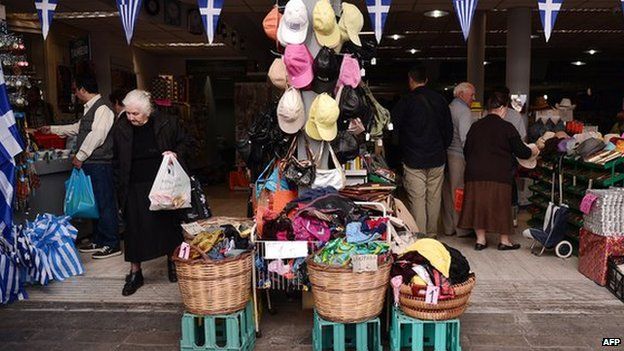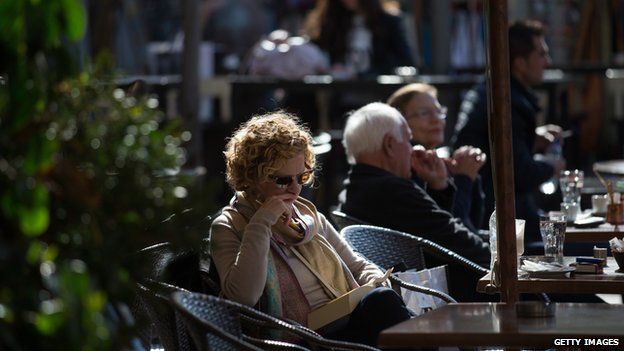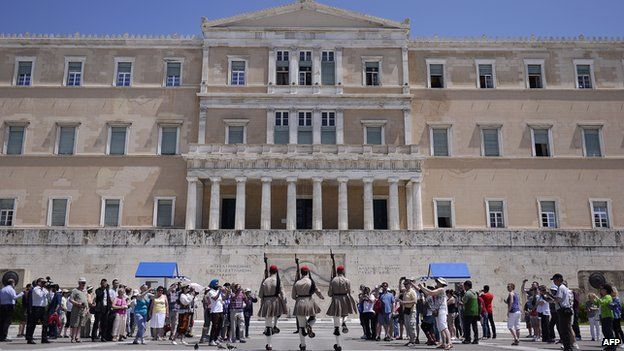Greece debt: What's it like to live under threat of default?
- 8 May 2015
- Europe
Sitting on his neighbour's steps in the sunshine, 68-year-old Ted Pantelidis does not look too stressed.
But ask the right questions, and the level of concern becomes more apparent.
"We look very anxiously - every morning, every afternoon, every day - at the news," he says.
"I've got a bad feeling we're not going to get a good ending."
Greece got through its latest crisis point last week, repaying 200m euros (£145m; $224m) to the IMF.
But the government straightaway turned its attention to Monday's Eurogroup meeting and the repayment of 763m euros due to the IMF on Tuesday.
As the debt talks drag on in Brussels, Greek newspapers, radio and television broadcasts shout about the next big challenge.
And it is not just the headlines that live by the deadlines.
Pensioners like Ted were alarmed this month to find their pension payment was delayed.
The government said it was due to a technical error, but reports suggested it had struggled until the last minute to find the cash.
"It's so hard. You can't plan for the future," says Ted.
"People are scared - everybody is waiting to see what is going to happen."

Greece has not received any loans from the eurozone or the IMF since August 2014.
There are 7.2bn euros (£5.3bn; $8bn) left in the country's bailout programme, but creditors refuse to release the money until Athens implements further reforms, involving more spending cuts and tax increases.
Meanwhile the Greek government, led since January by the leftist Syriza party of Prime Minister Alexis Tsipras, is refusing to go against its anti-austerity pre-election promises.
Daily uncertainty
Ted and I meet in Petralona, a residential area at the foot of ancient Filopappou Hill in central Athens.
A nearby square is fairly busy, with cafe customers lining the pavements - their conversations often turning to the economy.
Living with uncertainty is a daily reality.
"People are already so stressed, we can't get any more so," a local bar owner tells me.
A young graphic designer walking her dog says she avoids watching TV because it makes her feel nervous.
"And every time I do, it's always the same thing."

'Happening tomorrow?'
"People in Greece are extremely aware of the payments coming up," says Jerome Roos, a Dutch political economist and activist following the debt crisis negotiations in Greece.
"They live by the deadlines.
"But it is the same old story. Default has been 'happening tomorrow' for five years - but now is the moment that it might actually happen tomorrow."

Greece's urgent payment demands
- 12 May: more than 750m euros for a repayment to the IMF
- June: more than 2.6bn euros, including 1bn euros to IMF
- July-August: more than 8.7bn euros, including 7bn euros to European Central Bank in bond redemptions

Researchers have pointed to an increase in suicides and depression during the economic crisis in Greece, partly due to soaring unemployment, which currently stands at around 25%.
The previous government was criticised for not responding adequately to the increasing demand for mental health support.
Prof George Christodoulou, honorary president of the Hellenic Psychiatric Association, says many people in Greece suffer chronic stress as a result of the crisis.
The most marked change in recent years has been a broader sense of grief among the country's population, he adds.
"Presently the people have lost their patience. They are under the influence of chronic stress that is inflated by the media and they are worried about their future and the future of their children."
He says this has made many people vulnerable - willing to rid themselves of stress at any cost.
"This is potentially a very dangerous crossroad. The sooner this situation crystallises, the better."

Anti-austerity campaigners have pointed to the detrimental health impact of economic policies, when arguing against spending cuts and tax increases.
Some experts believe this should be taken into account by the EU and IMF, as Greece attempts to renegotiate the terms of its 240bn euros international bailout.
Meanwhile Dimitri Sotiropoulos, associate professor in political science at the University of Athens, warns that "economic despair" could lead to increasing support for extreme parties in Greece.
Leaders of Greece's far-right Golden Dawn party are currently on trial in Athens, on charges including murder and belonging to a criminal organisation.
Back in Petralona, Dimitra Apostolopoulou, 40, is picking up bread from a bakery as her children wait in the car.
"I feel very worried because of the economic situation," she says. "But what can we do?"
Many here seem to do be doing the best thing they can - sit in the sunshine and wait.
No comments:
Post a Comment